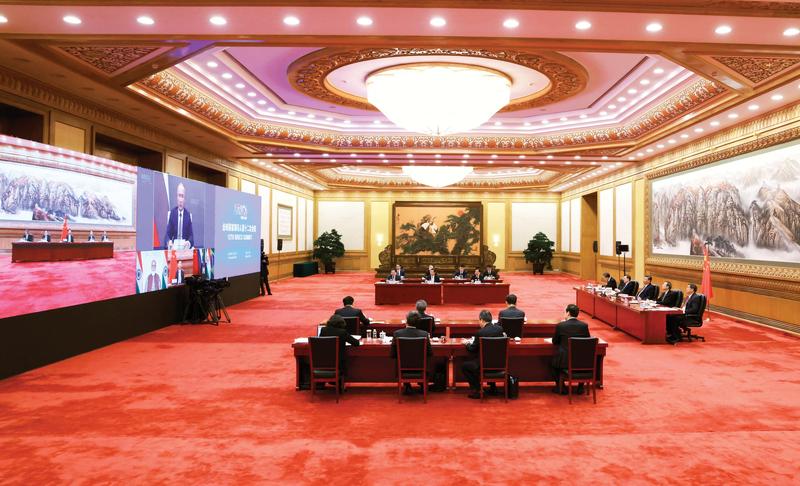 Chinese President Xi Jinping attends the 12th BRICS summit via video link in Beijing on Nov 17. (DING LIN / XINHUA)
Chinese President Xi Jinping attends the 12th BRICS summit via video link in Beijing on Nov 17. (DING LIN / XINHUA)
Chinese President Xi Jinping expounded on how China’s unlocking market potential, wider opening up and deepening international cooperation under the new development paradigm will offer more development opportunities and shared prosperity to the world.
In a speech delivered via video link to the Asia-Pacific Economic Cooperation CEO Dialogues on Nov 19, Xi said the new development pattern will enable China to fully unlock its market potential and create greater demand for other countries.
“As China’s economy grows, our people naturally want to lead an even better life. This will create more demand for a greater variety of quality products, technologies and services from across the world,” he said.
The new development paradigm will enable China to open up wider and share more opportunities for common development with other countries, Xi said.
China’s opening-up policy will not change at any time, he stressed.
At the 12th BRICS Leaders Summit on Nov 17, the Chinese leader also emphasized China’s opening in the “dual circulation” development paradigm, with domestic circulation as the mainstay and domestic and international circulations reinforcing each other.
The BRICS strategy for economic partnership through 2025, a key guideline for further enhancing business cooperation reached at the end of the summit, will effectively accelerate the pace of global economic recovery in the coming years, officials and experts said. BRICS is an acronym for the five major emerging countries of Brazil, Russia, India, China and South Africa.
The strategy provides a clear road map for the economic and trade cooperation of BRICS countries in the next five years in trade, investment, finance, digital economy and sustainable development, said Chen Chao, deputy director-general of the Department of International Trade and Economic Affairs at the Ministry of Commerce.
The strategy determines the medium-term priorities for development of the bloc’s interaction in trade, investment, finance, assistance to micro, small and medium-sized enterprises, and the digital economy, for sustainable growth, he said.
Chen made the remarks after President Xi called on BRICS countries to uphold multilateralism and work in solidarity to overcome global challenges, including the COVID-19 pandemic and the virus-hit world economy, during the summit via video link in Beijing on Nov 17.
The summit comes at a critical time of profound challenges posed by COVID-19.
Xi said China will work with all parties to strengthen BRICS members’ anti-pandemic actions and ensure pragmatic economic and trade cooperation, maintain the security and smoothness of the global supply and industrial chains, and support the multilateral trading system.
He said more cooperation will be undertaken during the era of digitization, as well as new infrastructure and high-tech industrial development, as BRICS members hope to make a faster recovery from the disruption caused by the pandemic.
Rajiv Biswas, Asia Pacific Chief Economist for global consultant IHS Markit, said President Xi had delivered a speech in which the future of BRICS was well laid out.
The BRICS economic cooperation agenda has broadened significantly in recent years, including the infrastructure project lending program of the New Development Bank that was founded by the BRICS members.
Beyond the joint economic cooperation initiatives among the BRICS countries, the BRICS grouping has engaged with other countries to provide global leadership for the wider grouping of developing nations.
“Therefore it is to be hoped that the long-term economic development vision and commitment to multilateral cooperation under the umbrella of the BRICS Forum will prevail among the BRICS member nations despite geopolitical differences that arise between some BRICS members,” he said.
Tim Harcourt, J.W. Nevile Fellow in Economics at the University of New South Wales Business School, said Xi’s comment about “upholding multilateralism” was worth noting.
The global problems have global solutions and no individual country is in a position to fight this kind of pandemic alone. So we all have to work together, said Bilal Ahmad Butt, consul general of Pakistan in Hong Kong.
“President Xi Jinping is absolutely right that we all will have to come together to find a solution to the global problems.”
Alexander Lomanov, chief research fellow of the Institute of World Economy and International Relations at the Russian Academy of Sciences, described the RCEP agreement as “a huge success” for all countries in the Asia-Pacific region.
“In the long run, the agreement will radically change the economic balance of power in Asia and the entire world,” Lomanov said.
Yang Han in Hong Kong, Ren Qi and Xinhua in Moscow contributed to the story.


